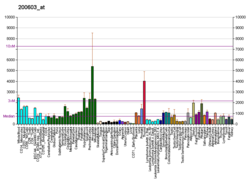Top Qs
Timeline
Chat
Perspective
PRKAR1A
Protein-coding gene in the species Homo sapiens From Wikipedia, the free encyclopedia
Remove ads
cAMP-dependent protein kinase type I-alpha regulatory subunit is an enzyme that in humans is encoded by the PRKAR1A gene.[5]
Remove ads
Function
cAMP is a signaling molecule important for a variety of cellular functions. cAMP exerts its effects by activating the cAMP-dependent protein kinase A (PKA), which transduces the signal through phosphorylation of different target proteins. The inactive holoenzyme of PKA is a tetramer composed of two regulatory and two catalytic subunits. cAMP causes the dissociation of the inactive holoenzyme into a dimer of regulatory subunits bound to four cAMP and two free monomeric catalytic subunits. Four different regulatory subunits and three catalytic subunits of PKA have been identified in humans. The protein encoded by this gene is one of the regulatory subunits. This protein was found to be a tissue-specific extinguisher that downregulates the expression of seven liver genes in hepatoma x fibroblast hybrids Three alternatively spliced transcript variants encoding the same protein have been observed.[6]
Remove ads
Clinical significance
Functional null mutations in this gene cause Carney complex (CNC), an autosomal dominant multiple neoplasia syndrome. This gene can fuse to the RET protooncogene by gene rearrangement and form the thyroid tumor-specific chimeric oncogene known as PTC2.[6]
Mutation of PRKAR1A leads to the Carney complex, associating multiple endocrine tumors.[citation needed]
Interactions
PRKAR1A has been shown to interact with:
See also
References
Further reading
External links
Wikiwand - on
Seamless Wikipedia browsing. On steroids.
Remove ads








